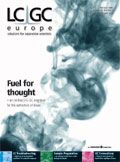1200 series LC system launched
Agilent Technologies has introduced the 1200 Series liquid chromatography system as a successor to its 1100 Series LC. Liquid chromatography represents a $2 billion market and is one of the largest sources of revenue for Agilent's life science and chemical analysis business. Since introducing the 1100 Series instrument in 1995, Agilent has sold more than 400000 modules or 60000 LC systems. To ease the transition to the 1200 Series, the company has made the system reverse-compatible with the 1100 so that customers can combine new and existing modules and continue using existing methods without costly new method development, revalidation or retraining of operators. With more than 60 instrument modules, the system can be configured for all major LC applications, including a rapid-resolution format, preparative scale, standard, narrow, capillary, nanoflow and the company's chip-based liquid chromatography.
Agilent Technologies has introduced the 1200 Series liquid chromatography system as a successor to its 1100 Series LC. Liquid chromatography represents a $2 billion market and is one of the largest sources of revenue for Agilent's life science and chemical analysis business. Since introducing the 1100 Series instrument in 1995, Agilent has sold more than 400000 modules or 60000 LC systems. To ease the transition to the 1200 Series, the company has made the system reverse-compatible with the 1100 so that customers can combine new and existing modules and continue using existing methods without costly new method development, revalidation or retraining of operators. With more than 60 instrument modules, the system can be configured for all major LC applications, including a rapid-resolution format, preparative scale, standard, narrow, capillary, nanoflow and the company's chip-based liquid chromatography.
System specifications vary depending on the complete configuration purchased, however, all configurations feature a "push for help" feature. With a click of the mouse, instrument configuration details, recent logbook and user contact information are transmitted over a secure connection to an Agilent customer support centre for immediate attention.
SMB technology streamlines processes
KNAUER Advanced Scientific Instruments has recently signed an agreement with the Max-Planck-Gesellschaft for the exclusive distribution rights to its feed-modulated simulated moving bed (SMB) process technique known as "Modicon". This technology was developed under the supervision of Professor Seidel-Morgenstern of the Max-Planck Institute in Magdeburg, Germany. This technology is said to enhance SMB processes in terms of higher purity and increased productivity. Additional strengths of this technology in comparison to batch chromatography are higher recovery rates, concentrated product streams (no dilution), and the possibility of using adsorbents with large particle sizes without loss of process performance.
Wyatt expands into the Netherlands
Wyatt Technology Corporation has established a new technical office in Peize, the Netherlands. The new Dutch office has been founded to offer continuous technical support to existing and new customers and also initiate sales projects to meet the growing demand for Wyatt Technology's products in the proteomics, polymer, biotech, pharmaceutical, academic and government sectors in the Netherlands.
Kees De Ruijter, who will oversee the sales and technical support of Wyatt Technology's multi-angle light-scattering instruments throughout the Dutch market, manages the facility. Wyatt already has offices established in the UK, Germany and France.
Demonstration centre offers hands-on experience
Thermo Electron has opened a customer demonstration laboratory in Mumbai, India, to serve local pharmaceutical, automobile, agricultural, environmental and petroleum/petrochemical market sectors. The site will be equipped with customer demonstration and training facilities, offering regional customers hands-on experience with the company's laboratory and manufacturing process solutions. The demonstration centre will house ion trap and triple quadrupole mass spectrometers, centrifuges, incubators and microplate instruments, along with several process instruments. Visitors of the facility will be able to receive training on these solutions and analyse samples before deciding to purchase.
"Building Thermo's capabilities throughout India and across Asia is a logical and important part of this growth strategy," said Marijn Dekkers, president and CEO of Thermo. "India and the surrounding regions represent a major market for laboratory and process instrumentation, and therefore, a tremendous opportunity for long-term growth and expansion for Thermo."
Thermo Electron already has Indian operations in New Delhi, Bangalore, Pune, Hyderabad, Kolkata and Chennai.
Grace acquires Indian HPLC company
W.R. Grace and Co. has acquired Flexit Laboratories, a manufacturer and supplier of chromatography products headquartered in Pune, India. Flexit is a privately held company that manufactures columns and accessories for HPLC and SPE for life science and analytical companies. The company will be incorporated into the Discovery Sciences business of Grace's Davison Chemicals segment.
"This acquisition reflects our commitment to growing our Discovery Sciences business as well as our presence in India," said Greg Poling, president, Grace Davison. "This acquisition is particularly suitable since India's support for research and manufacturing investment encourages pharmaceutical and life science firms to establish a presence in that country. With Flexit, we will be positioned to grow along with these companies." This is the company's sixth acquisition for the Discovery Sciences group since 2001.
Determining Enhanced Sensitivity to Odors due to Anxiety-Associated Chemosignals with GC
May 8th 2025Based on their hypothesis that smelling anxiety chemosignals can, like visual anxiety induction, lead to an increase in odor sensitivity, a joint study between the University of Erlangen-Nuremberg (Erlangen, Germany) and the Fraunhofer Institute for Process Engineering and Packaging (Freising, Germany) combined behavioral experiments, odor profile analysis by a trained panel, and instrumental analysis of odorants (gas chromatography-olfactometry) and volatiles (gas chromatography-mass spectrometry).
Investigating 3D-Printable Stationary Phases in Liquid Chromatography
May 7th 20253D printing technology has potential in chromatography, but a major challenge is developing materials with both high porosity and robust mechanical properties. Recently, scientists compared the separation performances of eight different 3D printable stationary phases.
Detecting Hyper-Fast Chromatographic Peaks Using Ion Mobility Spectrometry
May 6th 2025Ion mobility spectrometers can detect trace compounds quickly, though they can face various issues with detecting certain peaks. University of Hannover scientists created a new system for resolving hyper-fast gas chromatography (GC) peaks.

.png&w=3840&q=75)

.png&w=3840&q=75)



.png&w=3840&q=75)



.png&w=3840&q=75)









